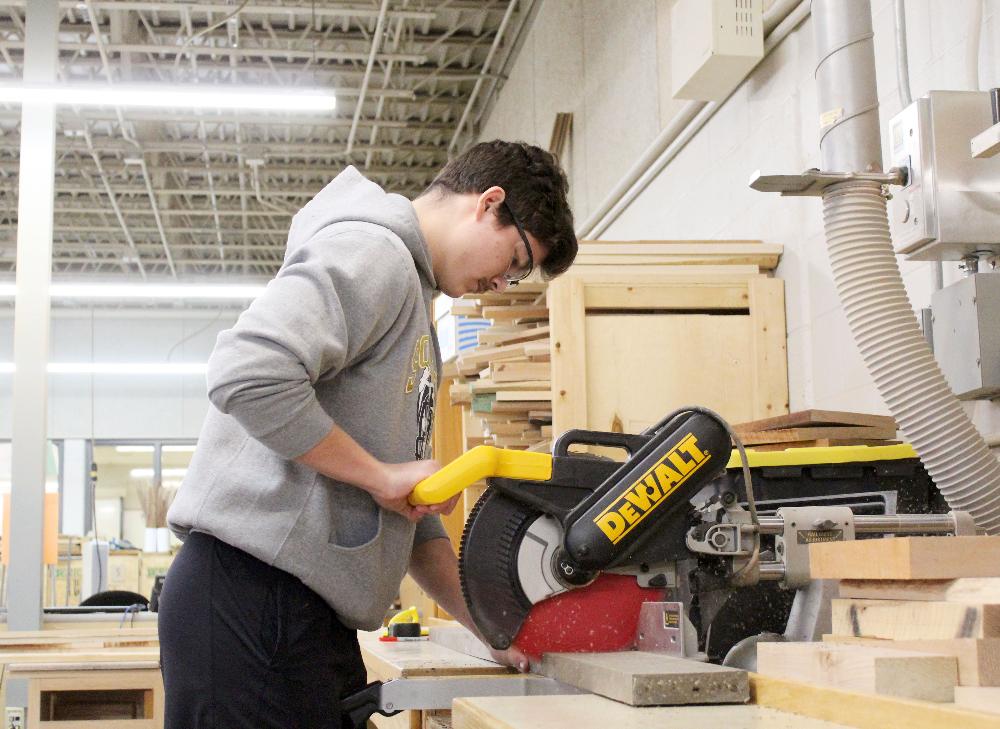Southeast woodworking project turns old plastics into new picnic table
March 12, 2024
Southeast High School students are proving that plastic forks, knives and spoons don’t have to see their lifespans end once families use them at picnic sites.
Members of Aaron Svik’s skilled and technical sciences (STS) class are creating a picnic table from plastic-generated recycled lumber. Omaha-based First Star Recycling donated lumber made from hard-to-recycle plastics to Lincoln Public Schools this semester. Southeast is the first LPS site to use the material through the Project School Board initiative.
Sam is a senior in Svik’s woodworking class and has taken a leading role in the venture. He has finished many construction projects at both home and school with natural lumber, but this is his first time moving recycled wood under a table saw. He was enthusiastic about having a chance to work with the material at school.
“I just think it’s a good idea to reuse the plastic,” Sam said. “We waste a lot of it, so it’s nice to have another use for it.”
Svik said he was intrigued when LPS Sustainability Coordinator Brittney Wees told him about the possibility of using recycled lumber. Svik provided project specifications to First Star Recycling earlier this school year, and he picked up all of the donated lumber and blueprints in mid-February. He said it has been a good learning experience for his students.
“It works just like regular lumber, so there was really no difference there other than there’s a few times we had to remind ourselves that we’re not quickly able to just get more, so we had to double check: measure twice, cut once,” Svik said.
Svik’s construction knowledge has played a key role in the project. He has taught STS classes at Southeast for 26 years and has helped students build wooden picnic tables for Prescott Elementary School and a local outdoor business. He has also used similar recycled products before on personal projects.
Wees was thrilled when Svik said he was on board with the project. The final location for the picnic table is still to be determined, but Wees said it is highly likely it will be placed at one of the LPS elementary schools.
“Manufactured materials like this are not something new, so there’s a lot of examples out there,” Wees said. “It’s really something that’s been vetted as stable and sturdy that’s safe to use for something like a picnic table.”
The project came about after Wees and other LPS sustainability team members began a pilot program with special orange recycling bags. Nebraska Department of Environment and Energy helped LPS purchase the bags through a waste reduction and recycling grant.
People can place hard-to-recycle materials such as granola bar wrappers, Styrofoam cups, plastic film and plastic cutlery in the orange bags. First Star Recycling can turn all of those items into a material that looks like large strands of carpet or insulation. Those can then be merged into bigger products such as lumber.
Wees said the emergence of new recycling technology has been energizing. She displayed a plastic spoon, fork and knife in Southeast’s woodshop as she talked about the environmental advantages of the new lumber.
“These are all types of materials that previously would have had to end up in our landfill, and now they have a place to be recycled and turned into something new,” Wees said.
Wees said using recycled lumber reduces the number of trees that are harvested. There is also long-term value for building recycled picnic tables in Nebraska. Unlike natural wood, lumber made from recycled plastics will not rot or splinter.
“The wooden ones will break down eventually, but this is something that won’t rot,” Wees said. “It’s really exciting from that standpoint.”
Sam said he began the project with the same mindset as working with natural lumber. He took measurements and used a table saw to cut boards into either angles or straight lines. He then drilled holes in the pieces and installed bolts to connect them together.
“It’s not too different,” Sam said. “It’s basically the same stuff. It’s maybe just a little heavier.”
Wees said the picnic table project symbolizes how the district is teaching environmental skills to students. She was happy to see the Knights combine their STS talents with sustainability goals.
“Students obviously in these types of classes are gaining real skills, whether they’re going to go on to use them in a career or just in their personal life,” Wees said. “Having this opportunity for them to get their hands on this recycled plastic lumber is just one more way they can start seeing, ‘This is a viable product for me to use, I can be purchasing something that is better for the environment, I can be mindful of how I’m impacting my natural resources.’”
Wees said the LPS Operations Department has asked her about potentially building sheds and cabinetry with recycled lumber. She said STS students at other district schools would also have chances to create future projects.
“Really, the whole district is excited to start working with this locally-manufactured material,” Wees said.
That includes Sam, who is happy to know many generations will enjoy meals on his picnic table.
“I think it will be pretty cool to have this be around,” Sam said.
Do you have a story idea? Share it with the LPS Communications Team by filling out this form!
Published: March 12, 2024, Updated: March 14, 2024

